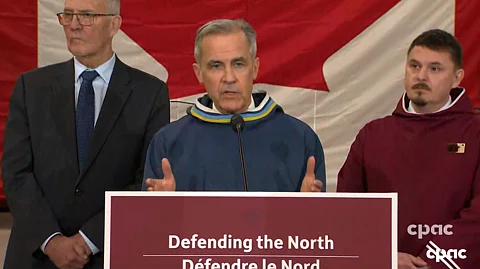

Newly selected Prime Minister Mark Carney travelled to Iqaluit Tuesday to announce his government’s plan to spend $253 million on “indigenous reconciliation initiatives" in Nunavut.
Carney also announced $420 million to increase Canadian Armed Forces (CAF) “presence” in the Arctic, but hasn't specified whether that will involve a military base.
The Liberals on March 6 promised to build “military support centers” in the Arctic, but not legitimate CAF bases. Conservative leader Pierre Poilievre has promised to build at least two.
Carney, in Iqaluit on the heels of a trip to meet European leaders, including King Charles, mentioned plans to exercise technology from Australia that can help identify threats from China and Russia — though no mention was made of any details, including cost or timeline.
“Today, I am announcing that my government will be working with Australia to establish an over-the-horizon early warning detection system” that will cost nearly $6 billion, Carney told reporters.
“We should not look to others to defend our nation.”
“We are masters in our own house, and we control our own destiny. That is obvious to me, and our government, and all Canadians.”
The long-range surveillance system is a key component of Canada’s NORAD modernization plan, said Carney.
“Now more than ever, we need to reaffirm Canadian sovereignty by strengthening our military, bolstering our Arctic security, and unleashing the North’s economic potential.”
As for the indigenous spending, Carney will allocate $94 million to upgrade four power plants in the territory and $20 million for a hydroelectricity project to deter diesel-fuel consumers, $74 million on housing infrastructure and $66 million to build, renovate, and repair homes for indigenous people.
Conservative MP James Bezan, shadow minister for national defence, told the Western Standard Carney's "photo-op re-announcement today once again proved what Canadians already know — he is just like Justin [Trudeau]."
"Re-announcing NORAD modernization projects, with no new money, that have been in the works for years and are behind schedule does nothing to fix the years of neglect and state of disrepair our forces are in," said Bezan.
He said the Tories meanwhile have a plan to provide CAF members "with the resources they need to defend and secure our skies, seas and soil."
"We will double the number of Rangers, acquire two new heavy icebreakers for the Royal Canadian Navy by 2029 and build CFB Iqaluit, Canada’s FIRST permanent base since the Cold War, in consultation with military experts and Indigenous Peoples," he said.
And to pay for this plan, the Tories "will dramatically cut foreign aid, much of which goes to dictators, terrorists and global bureaucracies."
"This is just our first step to protect the North and will come on top of the already-planned NORAD modernization plans that include, advanced air-to-air missiles, air-to-air refuelling aircraft and upgrades at the Forward Operating Locations in Inuvik, Yellowknife, and Goose Bay."
"Other upgrades include Airborne Early Warning Aircraft, Northern Operational Support Hubs, new submarines, tactical helicopters, and a satellite ground station in the Arctic."
Bezan added the Conservatives plan to do all this faster than the Liberals could "eliminating red tape and delays."
"If we are to be a sovereign and self-reliant nation, we must take back control of our north, secure all our borders and stand on our own two feet," said Bezan.
Nunavut Premier PJ Akeeagok in opening the press conference emphasized the vulnerability of the Arctic and the norther indigenous people.
“To ensure that our country remains the true north strong and free, we need to support the people of the Arctic,” he told reporters, adding they need a “chance to succeed” with a home and a career.
“Now the Government of Canada has made commitments to address our outstanding housing crisis.”
“These investments in upgrading four power plants across the territory” will go along way, he said, “but we need to do more.”
He also discussed the importance of “clean energy, reducing carbon footprints, renewable energy and decreasing dependence on diesel” in Nunavut.
